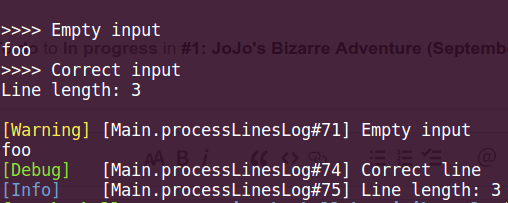co-log: Composable Contravariant Comonadic Logging Library
[ comonad, contravariant, library, logging, mpl, program ]
[ Propose Tags ]
[ Report a vulnerability ]
The default implementation of logging based on co-log-core.
The ideas behind this package are described in the following blog post:
[Skip to Readme]
Modules
[Index] [Quick Jump]
Flags
Automatic Flags
| Name | Description | Default |
|---|---|---|
| tutorial | Controls if tutorials get build (mainly to avoid building them on hackage). | Disabled |
Use -f <flag> to enable a flag, or -f -<flag> to disable that flag. More info
Downloads
- co-log-0.7.0.0.tar.gz [browse] (Cabal source package)
- Package description (as included in the package)
Maintainer's Corner
For package maintainers and hackage trustees
Candidates
| Versions [RSS] | 0.0.0, 0.1.0, 0.2.0, 0.3.0.0, 0.4.0.0, 0.4.0.1, 0.5.0.0, 0.6.0.0, 0.6.0.1, 0.6.0.2, 0.6.1.0, 0.6.1.1, 0.6.1.2, 0.7.0.0 |
|---|---|
| Change log | CHANGELOG.md |
| Dependencies | ansi-terminal (>=1.0 && <1.2), base (>=4.14 && <4.22), bytestring (>=0.10.8 && <0.13), co-log, co-log-core (>=0.3 && <0.4), containers (>=0.5.7 && <0.9), contravariant (>=1.5 && <1.6), dependent-map (>=0.4 && <0.5), dependent-sum (>=0.7 && <0.8), directory (>=1.3.0 && <1.4), exceptions (>=0.8.3 && <0.11), filepath (>=1.4.1 && <1.6), mtl (>=2.2.2 && <2.4), run-st (<=0.1.3.0), text (>=1.2.3 && <2.2), time (>=1.8 && <1.15), transformers (>=0.5 && <0.7), unliftio-core (>=0.2 && <0.3), vector (>=0.12.0.3 && <0.14) [details] |
| Tested with | ghc ==8.10.7, ghc ==9.0.2, ghc ==9.2.8, ghc ==9.4.8, ghc ==9.6.6, ghc ==9.8.4, ghc ==9.10.1, ghc ==9.12.1 |
| License | MPL-2.0 |
| Copyright | 2018-2022 Kowainik, 2023-2025 Co-Log |
| Author | Dmitrii Kovanikov |
| Maintainer | Kowainik <xrom.xkov@gmail.com> |
| Uploaded | by alaendle at 2025-04-06T15:04:40Z |
| Category | Logging, Contravariant, Comonad |
| Home page | https://github.com/co-log/co-log |
| Bug tracker | https://github.com/co-log/co-log/issues |
| Source repo | head: git clone https://github.com/co-log/co-log.git |
| Distributions | LTSHaskell:0.7.0.0, NixOS:0.7.0.0, Stackage:0.7.0.0 |
| Reverse Dependencies | 9 direct, 9 indirect [details] |
| Executables | tutorial-custom, tutorial-loggert, tutorial-loggert-simple, tutorial-intro, readme, concurrent-playground, play-colog |
| Downloads | 6323 total (32 in the last 30 days) |
| Rating | 2.5 (votes: 3) [estimated by Bayesian average] |
| Your Rating | |
| Status | Docs available [build log] Last success reported on 2025-04-06 [all 1 reports] |







